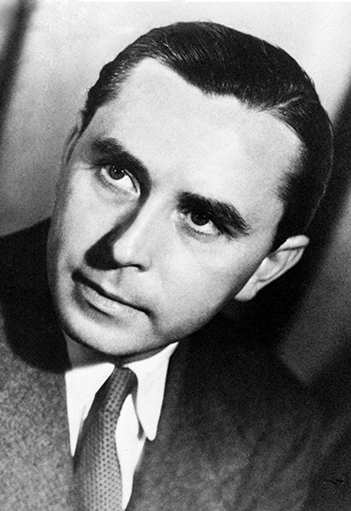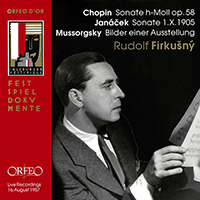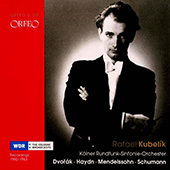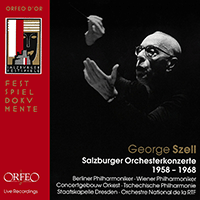Rudolf Firkušný
Neither of Firkušný’s parents was musical. His father died when Rudolf was four and at this time the boy was already picking out tunes on the piano. At five, his mother took him to Janáček at the Brno Conservatory who agreed to accept him as long as he gained a general education and did not lead the life of a child prodigy. He learnt the piano with Růzena Kurzová at the Brno Conservatory and from the age of six studied composition and theory with Janáček, who was a major influence on the young boy in the years from 1918 to 1928. At fourteen he went to the Prague Conservatory at Janáček’s suggestion, where he studied composition with Josef Suk, theory with Rudolf Karel and piano with Vilem Kurz; at his graduation he performed his own Piano Concerto. Firkušný then decided that he wanted to study with Schnabel and Cortot, but after playing for Cortot was refused as a pupil because Cortot thought he needed no further tuition. Cortot must have been impressed as he asked Firkušný to play in a concert he was conducting and to sit on the panel of judges for the final examinations at Cortot’s École Normale. After a year or so in Paris, Firkušný went to Italy to study with Schnabel. This last teacher had a great influence on him, in a musical rather than technical way.
The 1930s found Firkušný playing in Europe and at this time he began to champion the rarely-heard Piano Concerto by Dvořák. World War II led him to flee to France, Portugal, then England; and by 1941 he was in the United States playing the Dvořák concerto at the Ravinia Festival with Thomas Beecham. A very successful recital at New York’s Town Hall followed, and he was signed by Columbia Artists Management. A tour of South America in 1943 also went very well, as did further concerts in Europe and Israel during the late 1940s. Firkušný settled in New York and had a long career as a pianist, often collaborating with other musicians such as violinst Erica Morini and cellists Gregor Piatigorsky and Pierre Fournier. In 1990, after an absence of forty-four years, he returned to Czechoslovakia where he was showered with honours from his homeland.
Firkušný was a cultivated musician rather than an extrovert virtuoso. He had a large repertoire which included Beethoven, Mozart, Schubert, Chopin, Brahms and Debussy, as well as Czech music and twentieth-century works by many American composers. However, for an artist of his talent, Firkušný made a rather small number of recordings. His major series of recordings were made for Capitol records in New York City in the 1950s, and these were reissued as the Firkušný Edition on six compact discs in 1996. The highlight of this series is an excellent disc of four Beethoven piano sonatas. This is extremely fine Beethoven playing where Firkušný delivers each sonata with vitality, charm and elegance and a beautifully rounded sound. A selection of Brahms’s late piano works is complemented by performances of Brahms’s Sonatas Nos 1 and 2 for viola and piano; the violist is William Primrose, with whom Firkušný often played. A generous selection of Debussy includes Suite Bergamasque, Children’s Corner Suite and Estampes plus some of the préludes and shorter pieces; whilst a selection of short piano solos by Smetana is indispensable. A disc devoted to Schumann contains the Études Symphoniques Op. 13, Kinderszenen Op. 15 and Davidsbündlertänze Op. 6; and another is a Chopin recital ending with the Piano Sonata in B minor Op. 58.
Other recordings of note are those of Janáček, a recital of whose music Firkušný recorded for Deutsche Grammophon in 1972, and again for RCA in 1989. Also for RCA at the end of his life he recorded a number of discs, the repertoire of which includes Dvořák’s Piano Concerto in G minor, more Janáček, and Martinů cello sonatas with János Starker. A disc of Martinů’s Piano Concertos Nos 2, 3 and 4 (all of which were dedicated to Firkušný) was recorded in 1993 when Firkušný was eighty-one, and issued as a tribute after his death.
© Naxos Rights International Ltd. — Jonathan Summers (A–Z of Pianists, Naxos 8.558107–10).



















